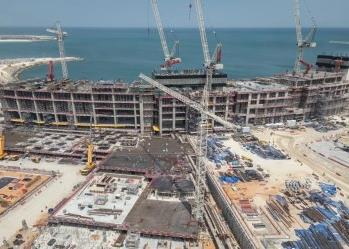
Algeria has attracted negligible interest from international oil companies
The third hydrocarbons bid round organised by Algeria’s Alnaft, the state licensing authority, has ended in more disappointment for the development of the country’s upstream oil and gas sector.
Contracts were signed on 31 March for just two of the 10 blocks offered in the round, and only one of them was awarded to an international oil company (IOC).
It is the third consecutive poor showing for Alnaft, created under the hydrocarbons law of 2005 to take over Sonatrach’s licensing responsibilities. In the first bid round organised by the agency, in December 2008, just four of 16 concessions on offer were attributed. In the second round, a year later, it awarded only three of 10 blocks.
“The outcome of the latest round is very disappointing, there’s no way to gloss that over,” says Samuel Ciszuk, senior analyst at London-based energy consultancy IHS Energy.
“Clearly the results are very poor,” says Hakim Darbouche, a specialist in Algeria at the Oxford Institute of Energy Studies.
Algeria’s ability to award so few concessions in the past five years is largely due to the severity of the licensing terms, say energy analysts and international executives.
Since 2006, the government’s prevailing political philosophy has been one of resource nationalism, focused on limiting foreign investment in the economy and preserving oil and gas reserves for the future, rather than on maximising production potential.
Amendments in 2006 to the hydrocarbons law rolled back changes that would have created a comparatively liberal investment regime, including measures to enable IOCs to take a majority stake in upstream blocks.
They also introduced a windfall tax on profits earned at oil prices more than $30 a barrel, charged on a sliding scale of between 5-50% depending on total output. According to Wood Mackenzie, an energy consultancy, Algeria’s licensing terms are among the most severe in the Middle East and North Africa region. “No one has been excited about Algeria’s terms for a long time,” says Ciszuk.
Circumstantial factors have also contributed to the poor showing of Algeria’s recent licensing rounds. The current bids may have influenced by destabilising protests throughout the region, while Alnaft’s first two rounds were held during the global economic downturn.
“The thing about the last three rounds is that, yes, there has been an issue over the terms, but they have also been held in extraordinary circumstances,” says Darbouche. “It’s disappointing, but we are yet to have a round under the existing terms under normal circumstances.”
There are other barriers to investment in Algeria that give IOCs pause for thought. The energy administration in Algeria is notoriously slow to make decisions, and in 2010 these problems were severely exacerbated by investigations into alleged corruption in the award of contracts by Sonatrach, which are still to reach a conclusion.
There has been the occasional bright spot. The successful licensing to Total in 2009 of the Ahnet block, which had been removed from the 2008 round due to a lack of interest, was a boost to the development of promising gas reserves in the southwest of the country.
The award of the Ahnet concession helped to give momentum to the development of three other fields in the southwest – Timmimoun, Touat and Reggane North – which will all evacuate gas through a new pipeline to Arzew on the north coast.
Development plans submitted by Spain’s Repsol for Reggane North were finally approved earlier this year after a two-year wait. Once all four fields are all on stream – from about 2015 – they will add more than 10 billion cubic metres a year (cm/y) to Algeria’s gas output.
But even the successful development of this new gas province will not be enough for the country to meet a combination of rapidly rising gas demand for domestic power production and exports through new pipeline and liquefied natural gas (LNG) infrastructure. The 8 billion cm/y Medgaz pipeline to Spain started operations at the end of March, and new LNG terminals in Skikda and Arzew are due to start up by 2014.
Algeria has plans to develop renewable energy capacity and is beginning to investigate its potential for shale gas, which could be as high as 1,000 trillion cubic feet, energy minister Youcef Yousfi told a conference in Houston in March. But these are likely to take at least a decade to develop.
In the meantime, a revision of the country’s licensing terms remains a possibility, but this could take time to filter through the political system. “A lot of oil and gas technocrats recognise what the problem is, but the politicians don’t,” says Ciszuk. “There’s not enough understanding of the crisis they’re in and the future problems they’re building for themselves.
“So far the technocrats haven’t been career suicidal enough to broach the subject of the terms. Perhaps after the latest round there will be more leeway. But we may be disappointed. The politicians have backed themselves into a corner and it will be hard for them to back down from their resource nationalist policy. They’ll try every other route before they go there.”
You might also like...

Saudi economy contracts in Q1 2024
07 May 2024

Kuwait plans electric vehicle strategy
07 May 2024

Aramco first quarter profit drops by 14.5%
07 May 2024
A MEED Subscription...
Subscribe or upgrade your current MEED.com package to support your strategic planning with the MENA region’s best source of business information. Proceed to our online shop below to find out more about the features in each package.





